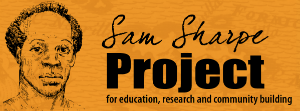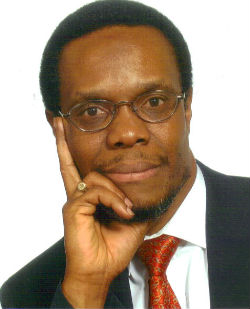Active resistance: participating in God's purpose
A report from the 2014 Sam Sharpe Lecture
The revolt led by a Baptist deacon that led to the end of slavery needs to be understood in a new theological context which will shine a true light on its relevance to today’s society.
 Historically the Sam Sharpe rebellion has been viewed as an active of passive resistance – and its theological implications therefore misunderstood – Baptist theologian Dr Delroy Reid-Salmon said this week.
Historically the Sam Sharpe rebellion has been viewed as an active of passive resistance – and its theological implications therefore misunderstood – Baptist theologian Dr Delroy Reid-Salmon said this week.
However, there are clear grounds for it to be described as an active resistance, an act that was knowingly breaking the law of the day yet birthed from an understanding of God’s purpose of freedom for all.
‘An active resistance contends with systems, ideologies, norms and values that are at odds with the purpose of God for humanity,’ explained Dr Reid-Salmon in the third annual Sam Sharpe Lecture, entitled Active Resistance – Participating in God’s Purpose, which was delivered to an audience at The House of Praise in Bristol on Wednesday.
‘So even though Sharpe and his fellow Freedom Fighters knew they were breaking the law and faced death by their actions, they were undeterred because they knew their cause was just. Their faith taught them that God made them free and Jesus Christ liberated them for freedom.’
The lecture is a key element of the Sam Sharpe Project, a partnership between our Baptist Union, the Baptist Union of Jamaica, Regent's Park College, BMS World Mission and others which launched in 2012. Dr. Reid-Salmon, a research fellow at Regent’s Park College and pastor of the Grace Baptist Chapel in New York, was a key instigator of the project, which explores the legacy of Sharpe, a Baptist deacon and enslaved person who instigated a general strike against his plantation owners in 1831.
The uprising that ensued lasted for eight days and resulted in the death of over 600 of the enslaved and 14 white persons. It was a key moment in the fight for the abolition of slavery as just a few years later, in 1834, slavery would be abolished.
Historically the Revolt has been viewed as an act of passive resistance, said Dr Reid-Salmon, with little relevance for today. In a large part this was down to the account and interpretation of Henry Bleby, a British Methodist minister who interviewed Sharpe during his imprisonment following the revolt.
Sharpe had told him it was not his intention to carry out any violent act, to fight only in self-defence. In addition he reported that Sharpe thought that if they all sat down and refused to go to work again in the capacity of slaves, it would be a very difficult thing for the masters to enforce such an immense body of people to work against their will.
Because of the non-violence and Sharpe’s use of the term “sit down”, Bleby subsequently described the Revolt as “passive resistance”.
 But this is a European construction, said Dr Reid-Salmon (pictured). Bleby could not interpret the Revolt from the perspective of the Freedom Fighters; moreover it contradicted Sharpe’s understanding of the Revolt: he was “overwhelmed and alarmed” by the response of his Fellow Freedom Fighters’ to his call; he had thought them a passive people due to the acceptance of the treatment they had received from the enslavers. Sharpe subsequently discovered that the impact of his call for resistance was “an awakening of the consciousness, the sensibility and desire for freedom.”
But this is a European construction, said Dr Reid-Salmon (pictured). Bleby could not interpret the Revolt from the perspective of the Freedom Fighters; moreover it contradicted Sharpe’s understanding of the Revolt: he was “overwhelmed and alarmed” by the response of his Fellow Freedom Fighters’ to his call; he had thought them a passive people due to the acceptance of the treatment they had received from the enslavers. Sharpe subsequently discovered that the impact of his call for resistance was “an awakening of the consciousness, the sensibility and desire for freedom.”
However, although his plan spiralled out of control, it cannot equally be described as an “armed resistance struggle for liberation”, because the intention was self-defence, not to wage any violence against the system and its keepers. The destructions of the plantations, loss of life and the war that followed were not part of the plan, and regretted by Sharpe.
A new term is therefore needed to explain what happened: and this term is active resistance, said Dr Reid Salmon.
A key understanding the Sam Sharpe rebellion in such terms is the oath committing those to it, which was sworn on the Bible and taken by all Freedom Fighters ahead of the rebellion. The oath was “a concrete expression of the relationship not only among the Freedom Fighters but between the Freedom Fighters and God, individually and collectively.”
In his lecture, Dr Reid-Salmon described in some depth the context, importance and meaning of the oath to the rebellion.
The oath highlights an “active pursuit of liberation”, Dr Reid-Salmon explained, ‘rooted in a faith and understanding of a God who not only wills liberation… but also desires total devotion from all persons. Jesus is the object of total devotion and allegiance. More precisely, embedded in this claim is the belief that Jesus is absolutely sovereign, the ultimate source of all existence, authority and power. The implication of all of this is that Jesus defeated the powers of domination and oppression and as such, liberated all persons, oppressed/enslaved and oppressors/enslavers for freedom.
‘The issue of how this liberation/freedom becomes a reality is what the Freedom Fighters were expressing through the act of oath-taking. This raises questions about the Revolt as passive resistance and simultaneously gives credence to the view of it as active resistance.’
Sharpe and his fellow Freedom Fighters therefore through a direct act of faith, Dr Reid-Salmon continued, became ‘partners in helping to make God’s purpose become a reality in history.’
He concluded: ‘Essentially, active resistance is the self-conscious, collective, intentional participation in God’s purpose of liberation contending with the social structures designed to maintain domination and perpetuate subjugation and oppression of human beings.
‘This is precisely what Sam Sharpe and his fellow Freedom Fighters swore to resist through his Revolt.'
‘If this Revolt is to be understood to have played a significant role in transforming society, such as the abolition of slavery in the British Empire,’ he added, ‘and as a particular theo-praxiological event that articulates the essence... of what it means to be a human being, then it must be considered as active resistance.’
Dr Delroy A. Reid-Salmon is a Research Fellow at the Oxford Centre for Christianity and Culture at Regent's Park College, University of Oxford. He is also pastor of the Grace Baptist Chapel in New York. He is a key instigator of the Sam Sharpe Project.
Baptist Times, 17/10/2014